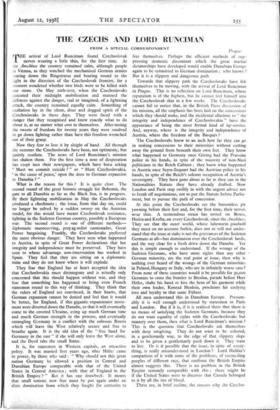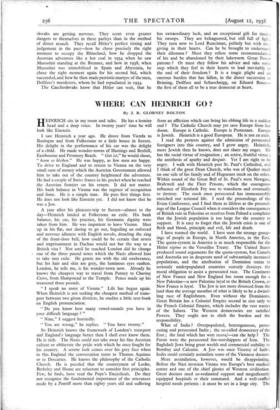THE CZECHS AND LORD RUNCIMAN
FROM A SPECIAL CORRESPONDENT
Prague.
roaring down the Ringstrasse and bearing round to the right in the direction of the Czechoslovak frontier, for a moment wondered whether two birds were to be killed with one stone. On May 2oth-asst, when the Czechoslovaks executed their midnight mobilisation and manned the defences against the danger, real or imagined, of a lightning attack, the country remained equally calm. Something of exaltation lay in the silent, dour and dogged spirit of the Czechoslovaks in those days. They were faced with a danger that they recognised and knew exactly what to do about it, at no matter what cost to themselves. After tasting the sweets of freedom for twenty years they were resolved to go down fighting rather than have this freedom wrenched out of their grasp.
Now they fear to lose it by sleight of hand. All through the summer the Czechoslovaks have been, not optimistic, but quietly resolute. The news of Lord Runciman's mission has shaken them. For the first time a note of desperation has crept into their newspapers, which have been asking " Must we commit suicide ? " or " Must Czechoslovakia, ' in the cause of peace,' open the door to German expansion in Danubia ? " - What is the reason for this ? It is quite clear. The second round of the great historic struggle for Bohemia, the gate to all Danubia as far as the Black Sea, is in progress.
By their lightning mobilisation in May the Czechoslovaks produced a checkmate ; the issue, from that day on, could no longer be solved by a sudden swoop on the Austrian model, for this would have meant Czechoslovak resistance, fighting in the Sudeten German country, possibly a European war. The second round is one of different methods— diplomatic manoeuvring, pror ag mdist cannonades, Great Power bargaining. Frankly, the Czechoslovaks preferred the more obvious danger. They have seen what happened to Austria, in spite of Great Power declarations that her integrity and independence must be preserved. They have seen to whose advantage non-intervention has worked in Spain. They feel , that they are sitting on a diplomatic mine and they do not knosi where it will explode.
They fear that England has at heart accepted the idea that Czechoslovakia must disintegrate and is actually only concerned that this should happen without war, and they fear that something has happened to bring even French statesmen round to this way of thinking. They think that the rulers of England are convinced, in their hearts, that German expansion cannot be denied and feel that it would be better, for England, if this gigantic expansionist move- ment were diverted down the Danube, so that it will eventually come to the coveted Ukraine, using up much German time and much German strength in the process, and eventually entangling Germany in a conflict with the colossus Russia which will leave the West relatively secure and free to breathe again. It is the old idea of the " free hand for Germany in the east " if she will only leave the West alone, and the Devil take the small States.
It is, for statesmen in Western capitals, an attractive policy. It was mooted first years ago, after Hitler came to power, by those who said : " Why should not this great nation Germany be allowed a position in Central and Danubian Europe comparable with that of the United States in Central America ; with that of England in the British Empire ? " But it has one drawback. It means that small nations now free must be put 'again under an alieh domination from which they fought for centuries to free themselves. Perhaps the efficient methods of sup- pressing domestic discontent which the great martial dictatorships have developed would enable Danubian Europe again to be submitted to German domination ; who knows ? But it is a slippery and dangerous path.
Towards that slippery path the Czechoslovaks have felt themselves to be moving, with the arrival of Lord Runciman in Prague. This is no reflection on Lord Runciman, whose reputation is of the highest, but he cannot feel himself into the Czechoslovak skin in a few weeks. The Czechoslovaks cannot fail to notice that, in the British Press discussion of his mission, all the emphasis has been laid on the concessions which they should make, and the incidental allusions to " the integrity and independence of Czechoslovakia " have the appearance of being the most formal kind of lip-service. And, anyway, where is the integrity and independence of Austria, where the freedom of the Basques ?
The Czechoslovaks know to an inch how far they can go in making concessions to their minorities without cutting away the ground from beneath their own feet. They know what happened to Germany once Goring had the Prussian police in his hands, in spite of the majority of non-Nazi politicians in the Reich Cabinet ; they know what happened to Austria once Seyss-Inquart had the Austrian police in his hands, in spite of the Reich's solemn recognition of Austria's sovereignty. They have gone about as far as they can in the Nationalities Statute they have already drafted. Now London and Paris step swiftly in with the urgent advice not to break off negotiations, not to put the Statute before Parlia- ment, but to pursue the path of concession.
At this point the Czechoslovaks see the bottomless pit yawning before their feet and, for the first time, their nerves wear thin. A tremendous strain has rested on Benes, Hodza and Krofta, on every Czechoslovak, since the Anschluss. They see that the outer world, whose lukewarm goodwill they must on no account forfeit, does not or will not under- stand that the issue at stake is not the grievances of the Sudeten Germans at all—but domination over the Czechoslovak lands, and the way clear for a fresh drive down the Danube. Yet this is simple enough to understand. If the wrongs of the Sudeten Germans, who have more rights than any other German minority, are the real point at issue, then why is nothing ever heard of the wrongs of the German minorities in Poland, Hungary or Italy, who are in infinitely worse case ? From none of these countries would it be possible for 30,000 Germans to cross the frontier to Breslau, parade before Herr Hitler, shake his hand or kiss the hem of his garment while their own leader, Konrad Henlein, proclaims his undying love and loyalty to that same Fiihrer.
All men understand this in Danubian Europe. Presum- ably it is well enough understood by statesmen in Paris and London. But if it is if it is realised there that there is no means of satisfying the Sudeten Germans, because they do not want equality of rights with the Czechoslovaks but mastery over them, then what is Lord Runciman's mission ? This is the question that Czechoslovaks ask themselves with deep misgiving. They do not want to be ushered, in a gentlemanly way, to the edge of that slippery slope and to be given a gentlemanly push down it. They want to live. Or is it possible that the issue, in spite of every- thing, is really misunderstood in London ? Lord Halifax's comparison of it with some of the problems, of reconciling peoples of different race, that confront the British Empire almost suggests this. There is no problem in the British Empire remotely comparable with this ; there might be if the United States were to discover that Canada belonged to it by all the ties of blood.
These are, in brief outline, the reasons why the Czecho- slovaks are getting nervous. They scent even greater dangers to themselves in these parleys than in the method of direct assault. They recall Hitler's perfect timing and judgement in the past—how he chose precisely the right moment to occupy the Rhineland, how he dropped the Austrian adventure like a hot coal in 1934 when he saw Mussolini standing at the Brenner, and how in 1938, when Mussolini was immobilised in Spain and Abyssinia, he chose the right moment again for his second bid, which succeeded, and how he then made patriotic martyrs of the men, Dollfuss's murderers, whom he had repudiated in 1934.
The Czechoslovaks know that Hitler can wait, that he has extraordinary luck, and an exceptional gift for timing his swoops. They are beleaguered, but still full of fight. They turn now to Lord Runciman, politely but with mis- giving in their hearts. Can he be brought to understand their dilemma ? Must they refuse some recommendation of his and be abandoned by their lukewarm Great Power patrons ? Or must they follow his advice and take some step which they feel in their hearts to lead inevitably to the end of their freedom ? It is a tragic plight and an onerous burden that has fallen, in the direct succession to Briining, Dollfuss and Schuschnigg, on Eduard Benes- the first of them all to be a true democrat at heart.







































 Previous page
Previous page